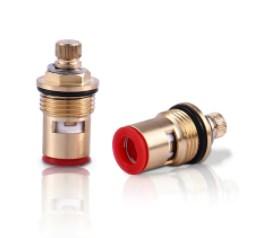How Environmentally Friendly Are the Raw Materials in a Ceramic Valve Core

The question of whether the materials used in producing a Ceramic Valve Core are environmentally friendly is increasingly relevant in a world that prioritizes sustainability and responsible manufacturing. Ceramic Valve Core components are primarily made from advanced ceramics, commonly alumina (aluminum oxide) or zirconia (zirconium dioxide). These materials are selected for their exceptional hardness, thermal stability, corrosion resistance, and long service life. From an environmental perspective, the raw materials themselves are naturally occurring minerals that are abundant in the Earth's crust, and the processing techniques, while energy-intensive, can be optimized to minimize ecological impact.
Alumina, one of the most common materials in a Ceramic Valve Core, is derived from bauxite ore, a naturally available resource. The refinement of bauxite into alumina and its subsequent sintering into ceramic parts does involve significant heat and energy, which can raise concerns about carbon emissions. However, the environmental trade-off is often considered favorable because the end product—the ceramic disc—is incredibly durable and long-lasting. Its life expectancy far exceeds that of traditional rubber or plastic-based valve components, which degrade more quickly and contribute to more frequent waste generation. This extended service life helps reduce the frequency of replacement, lowering the long-term resource consumption associated with plumbing components.
Another advantage from an environmental standpoint is the inert nature of ceramic materials. Once formed, a Ceramic Valve Core does not leach harmful substances into the water supply, nor does it degrade into microplastics or other pollutants. Unlike many plastic-based valves that may release volatile organic compounds (VOCs) or break down into harmful fragments, ceramics remain chemically stable and safe throughout their use. This contributes positively to indoor water quality and environmental safety, making ceramic a preferred material in applications where water purity is critical.
The manufacturing of ceramics can be made more eco-conscious through the use of renewable energy sources in kilns and by recycling ceramic waste from the production process. Some manufacturers have adopted closed-loop systems that capture and reuse heat, water, or by-products, further reducing the environmental footprint of Ceramic Valve Core production. Additionally, because the components are often smaller in size and highly efficient in material usage, the overall consumption of raw material per unit is relatively low, especially when compared to bulkier mechanical alternatives made from metal or composite materials.
Post-consumer recyclability of ceramics is limited, as ceramics cannot be remelted or reshaped like metals or plastics. However, their inert and non-toxic nature means they do not pose a risk in landfills, and some can be crushed and reused as construction filler or in ceramic composites, contributing to circular material applications. While the lack of widespread ceramic recycling infrastructure may be viewed as a drawback, the long operational life of a Ceramic Valve Core significantly offsets this concern from a sustainability perspective.
In conclusion, while the production of Ceramic Valve Core components does involve resource extraction and energy use, the materials themselves are largely considered environmentally friendly due to their natural abundance, chemical stability, and long-term durability. Their use promotes water safety, reduces waste through extended lifespan, and avoids many of the pollution concerns associated with synthetic polymers or metals. As environmental standards and green manufacturing practices continue to evolve, the Ceramic Valve Core is likely to remain a sustainable choice for high-performance plumbing systems.
- Art
- Causes
- Crafts
- Dance
- Drinks
- Film
- Fitness
- Food
- Spellen
- Gardening
- Health
- Home
- Literature
- Music
- Networking
- Other
- Party
- Religion
- Shopping
- Sports
- Theater
- Wellness


